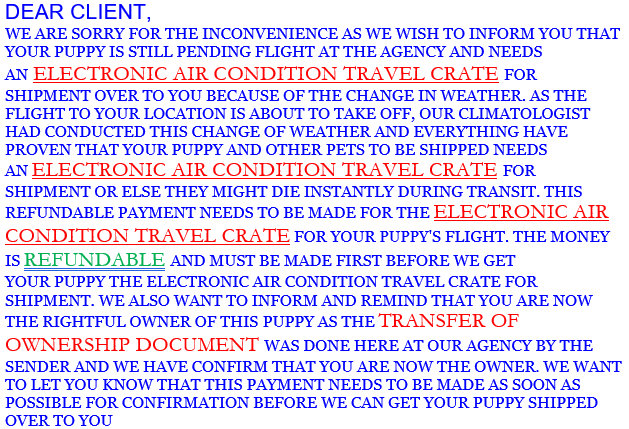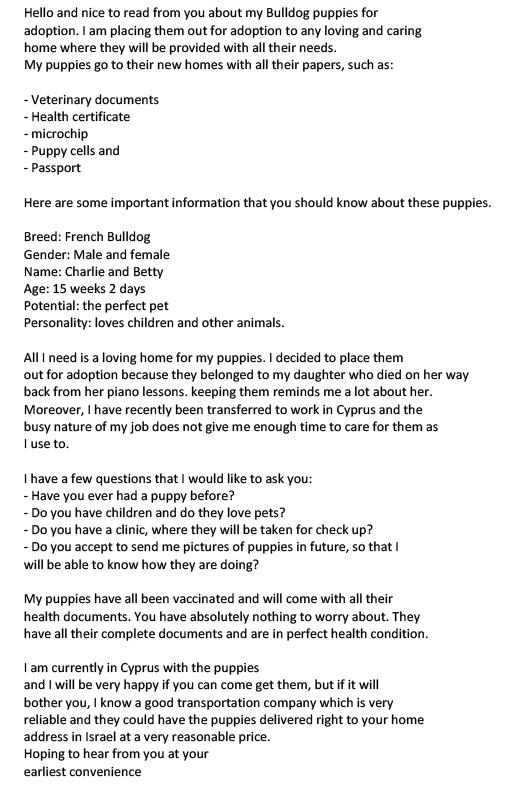Looking for a new furry friend online? Beware!
Scammers are lurking everywhere, ready to take advantage of your desire for a puppy, kitten, bird, monkey, or any other pet.
If you’re considering purchasing from an unknown source or an online ad, here’s what you need to know to avoid falling victim to a scam.
This guide will teach you How to Spot and Avoid Pet Scams so you can protect yourself and ensure you find a legitimate pet.

The Steps of a Typical Online Pet Scam:
- Searching for Pets: Most pet scams begin with a buyer searching online for free or cheap pets for sale, particularly puppies.
- Irresistible Offers: The seller often offers the pet for free and claims to ship it to you at a discounted price. Common stories include giving the pet away because a child passed away, relocating for a job, or moving to a pet-restricted house.
- Commitment and Extra Costs: Once you commit, the scammer requests additional money for various reasons like temperature-controlled crates, shipping insurance, extra paperwork, or vaccinations. They may even create fake email accounts and websites to impersonate airlines or shipping companies. They might threaten to report you for animal abandonment if you don’t send more money.
How Scams Work:
Scammers lure people with cute pictures and offers of pricey animals at rock-bottom prices. They often create a touching backstory—“I need to rehome this pet because I’m sick,” or “I’m moving and can’t take them with me.”
The catch? The story is fake, and the pictures are stolen from social media or other websites.
These scammers can be based anywhere. They often promise you a free pet or one at a discounted rate, asking you to cover the “shipping costs.”
You might receive official-looking documents and emails, sometimes even using names of reputable organizations like PetTravel.com or IATA to appear legitimate.
Here’s the red flag: After you send money, they might claim your pet is being held by customs for various non-existent reasons, demanding more money to release it. This is all a scam—there is no pet!
How to Spot a Pet Scam:
- Bad Grammar: Scammers often use translation tools, leading to awkward language or errors.
- Too-Good-to-Be-True Prices: Extremely low prices for high-demand breeds are a huge red flag.
- Inexpensive Shipping: International pet shipping is costly. If they’re offering it for next to nothing, be suspicious.
- Door-to-Door Service: This is rarely legitimate. It involves multiple agents and can be costly, making it a prime target for scams.
- Wire Transfers or Cash Cards: Scammers prefer these untraceable methods. If asked to send money to countries like Cameroon, it’s likely a scam.
- Suspicious Email Addresses: Check the domain after the “@.” For example, emails from [email protected] are not from the official business.
- No Phone Contact: Scammers avoid phone conversations. If you can’t reach them by phone, it’s a bad sign.
- Colorful Documents: Real pet transport documents don’t have flashy graphics or moving images. They’re plain and only available on the day of travel.
Examples of current pet scam emails: (Photos courtesy of IPATA)



What You Can Do to Prevent Being Scammed:

- Use Credit Cards: Credit cards offer protection and recourse. Avoid wire transfers or cash cards.
- Verify Contact Information: Test the phone number and contact the shipping company to confirm their involvement.
- Check Pickup Options: If you suggest picking up the pet in person and they refuse or make excuses, be wary.
- Understand Import Procedures: Research your country’s pet import requirements to ensure you know what’s needed.
- Search Known Scammers: Before purchasing, check the list of known pet scam emails and websites: IPATA Reported Scams.
Report Pet Scammers:
If you suspect you’ve been scammed, report it!
Report scams to the Consumer Protection Division at 1-800-368-8808, the Federal Trade Commission at ftc.gov, or at ic3.gov and petscams.com. You can also notify local authorities. While recovering your money may be difficult, reporting helps prevent others from falling victim.
Many reports come from victims. Contact [email protected] and other trusted sources to report your experience. These reports are compiled and posted in a list of known scammer emails and websites.
For more information, visit: IPATA Current Pet Scams.
Stay vigilant and don’t let scammers take advantage of your love for animals.